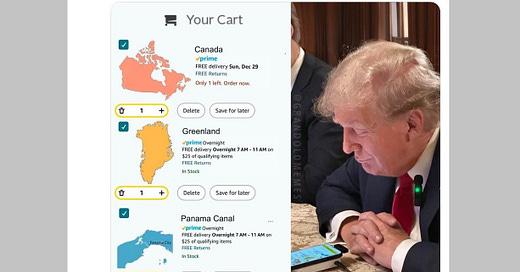Trump’s claims on Panama, Greenland and Canada are a gift to the CCP
We forfeit our ability to counter China’s imperial ambitions when the U.S. government does the same.
President-elect Trump has made news, again, by asserting unilateral claims to territories that are sovereign to others. His imperial proclamations, primarily via social media rants, have included:
asserting control over the Panama Canal “in full, quickly and without question;”
acquiring Greenland,
annexing Canada as the “51st state;” and
potentially invading Mexico.
Imperialism was his Christmas message to the country and the world:
Suffice to say that leaders and the people of these countries have zero interest in becoming part of the United States much less having Donald Trump be their head of state. But Trump cares as much for their right to territorial integrity as much as he did to E. Jean Carroll’s bodily integrity. Sexual predation and imperial predation derive from the same impulse.
Trump’s territorial ambitions echo what the People’s Republic of China is doing:
slicing away parts of Bhutan;
provocations along its disputed border with India’s Ladakh;
building villages along and inside of disputed territory within India’s Arunachal Pradesh;
claiming sovereignty over the Japan-held Senkaku Islands;
asserting ownership of Taiwan; and
claiming to control the sea and islands within a unilaterally-declared “nine-dash line” in the South China Sea.
China’s territorial ambitions are imperial in nature and rooted in historical revisionism. The exact same can be said for what Russia has done in Crimea and Ukraine. And so are Trump’s. He is mimicking the behavior of Xi Jinping (and Vladimir Putin).
The United States’ response to the PRC’s territorial ambitions has been based (until now) on upholding sovereignty – as in, a country’s right to uphold and defend its sovereign borders under international law and norms. PRC gains thus far have come by bending or breaking the rules. Chinese officials claim they aren’t, of course, but the U.S. (and allies and partners) have had the benefit of staying on the high ground, of claiming to defend the ‘rules-based order.’[1]
Trump’s approach is also based on a different definition of sovereignty – the one used by CCP leaders: the exercise of “supreme power.” In this view, the power to acquire is equivalent to a license to acquire – opinions of the local people be damned.
Under Trump, the U.S. would be operating under the same acquisitive principle as the PRC, erasing any moral argument, or legal one, that the U.S. government could make to counter the PRC’s territorial ambitions. That would be a big win for the CCP.
We criticize China, rightly, for acting like a bully. And now Trump copies them, acting like a bully.
A Trump advisor is now spinning his Panama gambit as designed to counter Chinese influence around the Canal, which sounds like the latest version of the pathetic “Trump plays 3D chess” his defenders deploy to explain his foolish bluster. Yes, there are Chinese operations at the Canal. But that doesn’t explain why he’s also talking about annexing other areas. Or whether annexation would be President Trump’s go-to response to Chinese influence elsewhere. Or why acquisition is the answer. Or how opposition among the Panamanian people would affect U.S. influence and interest.
The real test will come in Congress, under full Republican control starting next week. Will they push back against these Trump land-grabs, knowing the damage that it will do to the U.S.’s alliances and international reputation? Or will they yield in deference to the Party Leader’s America First agenda and give the CCP a win? Do they see the risks of the U.S. government adopting the attitude and behavior of the Chinese Communist Party they so frequently criticize? Or is loyalty to Trump a higher priority?
[1] Which they do not, notably and disastrously, in Gaza and the West Bank.





